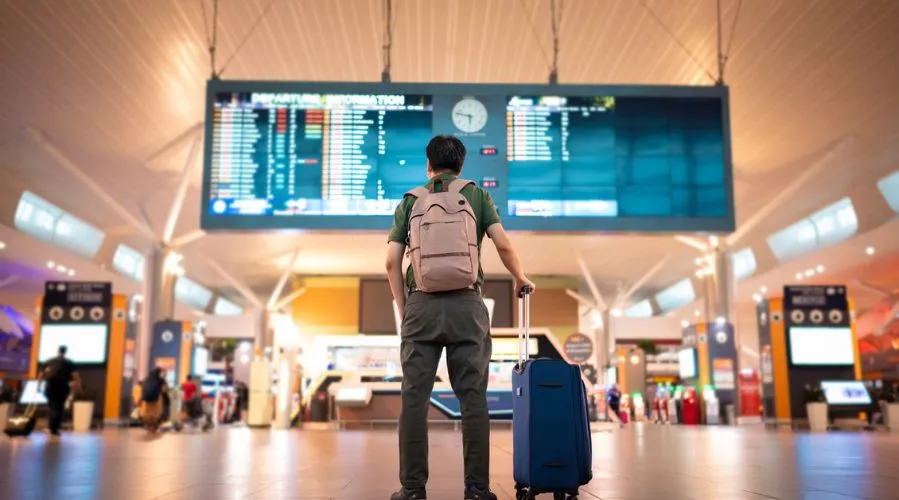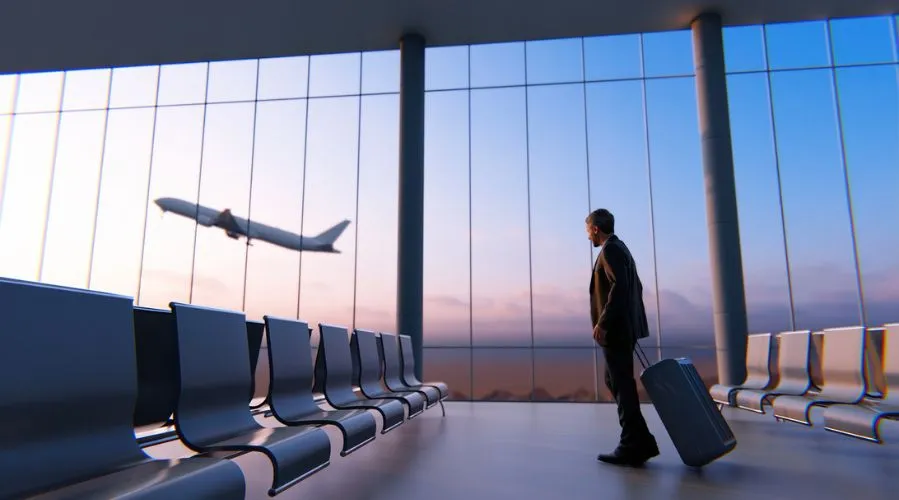Travel insurance is mandatory to obtain a visa for France
Fashion, History, Art! The reasons to visit Coco Chanel, Gustave Eiffel and Renoir’s home country abound! But while you might be over the moon at the idea of discovering the Château de Versailles, visiting relatives in Lyon or enjoying a glass of wine in Bordeaux, as a Filipino national you will need to apply for a Schengen visa to visit France. Otherwise, there will be no Montmartre caricaturists or Cannes Film Festival for you!
Don’t worry! The AXA team has prepared a step-by-step guide to help you through the process.
Grab your béret and start reading!
- Why do Filipinos need a visa to visit France?
- What type of visa do you need to travel to France?
- When should you apply for your Schengen visa for France?
- How to apply for a short-stay visa for France?
- What documents are required for a French visa?
- How much does a visa for France cost?
- How will you know if your application for a French visa has been accepted?
- How to choose the right travel insurance for a French visa?
Why is a visa compulsory for Filipinos to visit France?
As you probably already know, France is part of both the European Union and the Schengen area.
The obligation for a traveller to hold a visa to enter the Schengen area and the type of visa they need depend on their nationality, the purpose of their trip and on how long they intend on staying in the Schengen country they want to visit.
Several countries have signed a visa-waiver agreement with the EU which exempts their citizens from certain visa requirements. However, this is not the case of the Philippines. Consequently, Filipino nationals need to apply for a visa to visit Victor Hugo’s homeland.
Good to know: Filipinos are not the only ones subject to visa requirements to visit France.
Citizens from over a hundred third countries need a visa to travel to the Schengen area.
Among them:
- Algerian nationals must apply for a Schengen visa to visit France.
- Moroccans need a Schengen visa to travel to France.
- Tunisians also need to apply for a Schengen visa to visit France.
- Nationals of the Côte d’Ivoire must obtain a Schengen visa to travel to France.
- Nationals of the Democratic Republic of the Congo need a Schengen visa for France.
- Nationals of Madagascar also need a Schengen visa to travel to France.
- Nationals of Gabon must apply for a Schengen visa to visit France.
- Nationals of Senegal are also required to apply for a Schengen visa for France.
- Indian nationals also need a Schengen visa to visit France
- Citizens of Benin must apply for a visa to enter France.
- Cameroonians are required to hold a visa to travel to France.
What are the different types of visas to visit France?
There are several types of visas to visit France.
The purpose and the duration of your stay will determine which one you must apply for.
There are two main categories: short-stay and long-stay visas for France.
Short-stay visas for France
They are delivered for stays of 90 days (3 months) or less and are issued for the following reasons:
- Tourism,
- Business,
- Family visits,
- To follow a short training course (an internship or a language training trip to learn French for example),
- To attend or take part in a conference, a seminar, a sports or artistic event.
Good to know:
- The type C visa for France is the most commonly delivered. It is also called the short-stay Schengen visa or tourist visa for France.
- A Schengen visa allows you to stay/travel up to 90 days over a six-month period (180 days) in France and in all Schengen Member States.
Here’s how to understand the 90/180-day rule.
The long-stay visas for France
They are issued for stays longer than 90 days and each one is adapted to the duration and purpose of your stay: tourism, personal matters, medical care, professional activities, studies or training, family reunification, etc.
Good to know:
- Long-stay visas concern all nationalities! Even travellers from countries which have signed a visa waiver agreement for short-stays must apply for a long-stay visa if they intend on staying more than 90 days in France (and the rest of the Schengen area).
- The validity of long-stay visas (also called type D visa or national visa) is limited: from 3 months to a year.
Holders who wish to extend their stay in France beyond the validity date of their visa must apply for a residence permit at the prefecture.
Our AXA Tip: If you intend on staying in Joan of Arc’s home country longer than 90 days, don’t forget to read our step-by-step guide on how to obtain a long-stay visa for France.
Bonus info: Even if you are only transiting through France and will remain in the international zone of a French airport, you will need to hold an Airport Transit Visa (also called ATV or type A visa) if you are travelling from and to a country located outside of the Schengen area.
When should you apply for your visa for France from the Philippines?
You can apply for your short-stay visa 6 months before your scheduled date of departure at the earliest and 15 days before at the latest.
Our AXA Tip: To avoid unnecessary stress and disappointment in case of mishaps (the need to provide additional information for example), we strongly recommend not to wait too long and apply for your visa 6 weeks prior to your departure date.
How to apply for a short-stay visa for France?
Follow these steps to apply for a visa for France from the Philippines:
- Start by visiting the official France-Visas website and create a personal account from which you will register a preliminary application.
- Examine the list of supporting documents you must provide with your application file and answer a few questions on an online application form.
- Once you’ve carefully completed your visa application form, you must print it and sign it. You will need to enclose it with your application file and present it during your interview.
- At one point of the process, you will be redirected to the website of TLS Contact, the official service provider in charge of handling visa applications under the authority of the Embassy of France in Manila.
- On the TLS Contact website, book your appointment to submit your application file.
It will take place at one of the TLS Contact visa centres (either in Manila or Cebu depending on your place of residence).
You will then be asked to pay their service fees online.
Once the payment has been made, you will receive via email a letter confirming your appointment. You need to print it and present it on the day of your appointment. Without this document, you will not be granted access to the centre.
Good to know: if you intend on travelling with your family or a group, each participant must book individual appointments.
- During your appointment, you will hand in your visa application file with the supporting documents, your biometric data (picture and fingerprints) will be collected and you will pay the visa fees (in cash and using local currency). You will be given a receipt with a reference number. You must absolutely keep this receipt, as you will need it later.
- Your visa application for France will then be examined by the Embassy of France in Manila, the only institution authorised to grant or deny visa requests.
What documents must you provide with your French visa application?
Supporting documents which need to be enclosed with your visa for France application can vary depending on the purpose of the trip and the profile of the applicant. Consequently, you need to be particularly careful to the documents (originals and copies) mentioned on the list provided when you registered your request on the France-Visas website.
The list below is not exhaustive but indicates the documents most commonly required when a Filipino national applies for a short-stay tourist visa for France (less than 90 days).
- Your passport: issued less than 10 years prior to your application and valid for more than 3 months after your scheduled date of departure from the Schengen area. It must include 2 blank pages minimum.
- A recent ID photo, ICAO format.
- The completed and signed visa application form.
- A copy of your travel itinerary, supporting the purpose of your stay.
- Documents proving your living situation and connections to your home country. They vary depending on your status (company-employee, civil servant, self-employed, pensioner, student…) and are specified during your online visa application procedure.
- Documents proving your financial means. They are required to make sure you can provide for yourself during your stay (bank statements, pay slips, pension statements, no older than three or six months depending on your status). For children under 18: proof of the financial means of their parents or legal guardian.
- Proof of accommodation in France: hotel or rental booking confirmation, letter of invitation by a relative or friend.
- Your mandatory travel insurance certificate.
Beware! An incomplete application file can lead to your visa request being denied.
How much does a visa for France cost?
Visa fees depend on the age and the situation of the traveller.
Costs for a visa for France include:
- The visa fee itself, charged by the French consular authorities,
- The service fee paid to TLS Contact.
Beware! Visa and service fees are non-refundable even if your visa application is denied or if you withdraw your demand.
The price of a visa (or visa fee) depends on the age of the applicant and the type of visa (long or short-stay) they are applying for.
AXA tip: For more information, read our article detailing the costs entailed by a Schengen visa application.
How will you know if your application for a visa for France has been accepted?
Brace yourself, it’s going to be a long process!
You will be able to follow the progression of the examination of your application in your personal account created on the France-Visas website (tab ”track your application”).
You will enter the reference number featuring on the receipt delivered by the visa application centre and your surname before accessing the service.
You will only learn information about the progress made on the examination of your application and not whether it has been granted or denied.
When the authorities of the Embassy of France of Manila have reached a decision, they will send your passport back to the TLS Contact centre which in turn will inform you via email or text message and ask you to come recover your passport where you have left it. Only then will you know if your visa has been granted or not.
How will you know? If you find a secured sticker fixed on your passport, detailing all the features of your visa for France (type of visa, dates of validity, duration of your stay…) then you are good to go!
What travel insurance should you choose for your French visa?
In compliance with the Schengen visa Code, Filipino applicants who need a visa for France as well as all citizens of countries which require a Schengen visa must absolutely enclose with their application file a travel insurance certificate.
This mandatory medical travel insurance for future Schengen visa holders must meet several criteria to be valid. It must:
- Guarantee a coverage of 30,000 euros minimum,
- Cover the expenses linked to emergency health care, hospitalisation, sanitary repatriation and death,
- Be valid in all member States of the Schengen area (and not just France!).
- It must be valid during the entire length of the stay in the Schengen area.
- It must be provided by an insurance company approved by consulates and embassies of all Schengen countries.
WARNING!Without this travel insurance certificate, your visa application will be denied.
Save time and subscribe online to AXA travel insurance for France.
It meets all the necessary criteria to obtain a visa.
With its different options designed to suit all travellers’ needs and budget,
AXA visa travel insurance offers:
- comprehensive coverage
- many benefits
- excellent value for money!
Get your commitment-free, online quote now!
You might also find these articles interesting:
- How to track my visa for France application?
- How to book your appointment to submit your visa application?
- Visa for France: A step-by-step guide
FAQ
How can a Filipino national come visit me in France?
The Philippines hasn’t signed a visa waiver agreement with the European Union. Therefore, its nationals need a visa to travel to France.
If you live in France and want to welcome one of your Filipino relatives, you will need to provide an invitation letter if they are staying at your home. They will need to enclose it with their file.
When will I know if my visa for France application has been granted?
You should expect to wait between 10 and 15 days before receiving an answer. But this delay can be longer depending on the time of year when you apply (end of the year or summer holidays) or in certain situations which can require more thorough examination or additional information.
Where should I submit my French visa application?
You need to start by logging in on the France- Visas official website to start a pre-request for a visa for France. You will then need to book an appointment to hand in your file with the compulsory documents enclosed at the French consular services or certified visa centre of your place of residence.
AXA already looks after millions of people around the world
With our travel insurance we can take great care of you too
AXA Schengen's Travel Insurances

AXA Schengen Basic
AXA Schengen Basic is perfect to obtain your Schengen visa. This travel insurance meets all the requirements demanded, covers you in all the countries of the Schengen Area as well as 4 European microstates (Andorra, Vatican City, Monaco and San Marino).

AXA Schengen Essential
AXA Essential is perfect to obtain your Schengen visa. It provides coverage in all the Schengen countries + the European microstates + all the EU countries. And you get additional guarantees compared to AXA Schengen Basic.

AXA Schengen Annual
AXA Annual is perfect to obtain your Schengen visa. This annual travel insurance is ideal for those who often travel to Europe as well as multiple-entry Schengen visa holders. You get the same guarantees as AXA Schengen Annual for different countries during 90 days.


